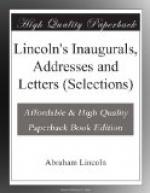I have asked his attention to the evidence that he arrayed to prove that such a fatal blow was being struck, and to the facts which he brought forward in support of that charge—being identical with the one which he thinks so villainous in me. He pointed it not at a newspaper editor merely, but at the President and his Cabinet, and the members of Congress advocating the Lecompton Constitution, and those framing that instrument. I must again be permitted to remind him, that although my ipse dixit may not be as great as his, yet it somewhat reduces the force of his calling my attention to the enormity of my making a like charge against him.
Go on, Judge Douglas.
THE COOPER INSTITUTE ADDRESS, MONDAY, FEBRUARY 27, 1860
Mr. President and Fellow-Citizens of New York: The facts with which I shall deal this evening are mainly old and familiar; nor is there anything new in the general use I shall make of them. If there shall be any novelty, it will be in the mode of presenting the facts, and the inferences and observations following that presentation.
In his speech last autumn, at Columbus, Ohio, as reported in the New York Times, Senator Douglas said:
Our fathers, when they framed the Government under which we live, understood this question just as well, and even better, than we do now.
I fully indorse this, and I adopt it as a text for this discourse. I so adopt it because it furnishes a precise and agreed starting point for a discussion between Republicans and that wing of the Democracy headed by Senator Douglas. It simply leaves the inquiry:
“What was the understanding those fathers had of the question mentioned?”
What is the frame of Government under which we live?
The answer must be, “The Constitution of the United States.” That Constitution consists of the original, framed in 1787 (and under which the present Government first went into operation), and twelve subsequently framed amendments, the first ten of which were framed in 1789.
Who were our fathers that framed the Constitution? I suppose the “thirty-nine” who signed the original instrument may be fairly called our fathers who framed that part of the present Government. It is almost exactly true to say they framed it, and it is altogether true to say they fairly represented the opinion and sentiment of the whole nation at that time. Their names, being familiar to nearly all, and accessible to quite all, need not now be repeated.




